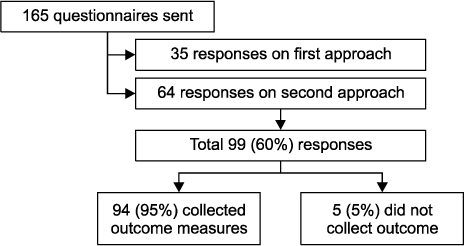Brain Neurorehabil.
2013 Mar;6(1):17-25. 10.12786/bn.2013.6.1.17.
The Survey of Outcome Measures in Department of Rehabilitation Medicine in Hospitals of Korea
- Affiliations
-
- 1Department of Rehabilitation Medicine, Pusan National University School of Medicine, Korea. drjoakl@gmail.com
- KMID: 2270735
- DOI: http://doi.org/10.12786/bn.2013.6.1.17
Abstract
OBJECTIVE
The objective of present study was to identify the rehabilitation outcome measures currently used in Korea. METHOD: The survey was conducted by e-mail questionnaire to 165 department of rehabilitation medicine in hospitals of Korea. Non-responders were sent a second copy of the questionnaire if they did not answer within 1 week. Data from the returned questionnaires were entered into a Microsoft Excel and subjected to descriptive and simple quantitative analysis.
RESULTS
A total of 99 (60%) responses were received. Of these, 95% units collected some outcome assessment measure as part of routine clinical practice. Korean version of Modified Barthel Index (K-MBI) (80%) was the most popular global outcome measures. The Korean version of Berg Balance Scale (K-BBS) (53%) was used most frequently for balance assessment. Upper extremity function was checked with hand grip strength test (70%) and Box and block test (67%) most commonly. Korean version of Mini Mental State Examination (K-MMSE) was the most popular cognitive function test (75%). PARADISE Korean version-Western Aphasia Battery (PARADISE K-WAB) was the most popular language test (67%). Sixty-three (67%) units used outcome results for discussion and goal setting. Seventy-eight (78%) units responded that they would use a standardized outcome measures if there is an agreed standardized outcome measures lists (80%) and support of money and time (43%).
CONCLUSION
The survey demonstrated that quite widespread use of outcome assessments in routine clinical rehabilitation within Korea. There is also an agreement for need of common 'basket' of recommended instruments for rehabilitation.
MeSH Terms
Figure
Reference
-
1. Potter K, Fulk GD, Salem Y, Sullivan J. Outcome measures in neurological physical therapy practice: part I. Making sound decisions. J Neurol Phys Ther. 2011. 35:57–64.2. Wade DT. Evidence relating to goal-planning in rehabilitation. Clin Rehabil. 1998. 12:273–275.3. Barak S, Duncan PW. Issues in selecting outcome measures to assess functional recovery after stroke. NeuroRx. 2006. 3:505–524.4. Skinner A, Turner-Stokes L. The use of standardized outcome measures in rehabilitation centers in the UK. Clin Rehabil. 2006. 20:609–615.5. Shah S, Vanklay F, Cooper B. Improving the sensitivity of the Barthel Index for stroke rehabilitation. J Clin Epidemiol. 1989. 42:703–709.6. Jung HY, Park BK, Shin HS, Kang YK, Pyun SB, Paik NJ, Kim SH, Han TR. Development of the Korean version of Modified Barthel Index (K-MBI): multi-center study for subjects with stroke. J Korean Acad Rehabil Med. 2007. 31:283–297.7. Lee JJ, Lee HJ, Jung HY. The Korean version of Berg balance scale as an index of activity related to ambulation in subjects with stroke. J Korean Acad Rehabil Med. 2007. 31:400–403.8. Berg KO, Wood-Dauphine'e SL, Williams JI, Maki B. Measuring balance in the elderly: validation of an instrument. Can J Public Health. 1992. 83:Suppl 2. S7–S11.9. Jung HY, Park JH, Shim JJ, Kim MJ, Hwang MR, Kim SH. Reliability test of Korean version of Berg balance scale. J Korean Acad Rehabil Med. 2006. 30:611–618.10. Harvan JR, Cotter V. An evaluation of dementia screening in the primary care setting. J Am Acad Nurse Pract. 2006. 18:351–360.11. Gorp WG, Marcotte TD, Sultzer D, Hinkin C, Mahler M, Cummings JL. Screening for dementia: comparison of three commonly used instruments. J Clin Exp Neuropsychol. 1999. 21:29–38.12. Shin MH, Lee YM, Park JM, Kang CJ, Lee BD, Moon E, Chung YI. A combination of the Korean version of the mini-mental state examination and Korean dementia screening questionnaire is a good screening tool for dementia in the elderly. Psychiatry Investig. 2011. 8:348–353.13. Kim H, Na DL. Normative data on the Korean version of the Western Aphasia Battery. J Clin Exp Neuropsychol. 2004. 26:1011–1120.14. Lee KJ, Lee CJ, Kim JH, Jung SM. Concurrent validity of the Korean test for the differential diagnosis of aphasia. Korean J Commun Disord. 2009. 14:58–69.15. Wilde MC. The validity of the repeatable battery of neuropsychological status in acute stroke. Clin Neuropsychol. 2006. 20:702–715.16. Pierce CA, Jewell G, Mennemeier M. Are psycholphysical functions derived from line bisection reliable? J Int Neuropsychol Soc. 2003. 9:72–78.17. Aben I, Verhey F, Lousberg R, Lodder J, Honig A. Validity of the Beck depression inventory, hospital anxiety and depression scale, SCL-90, and Hamilton depression rating scale as screening instruments for depression in stroke patients. Psychosomatics. 2002. 43:386–393.18. Rhee MK, Lee YH, Park SH, Shon CH, Chung YJ. A standardization Study of Beck Depression Inventory 1 - Korean version (K-BDI): reliability and factor analysis. Korean J Psychopathol. 1995. 4:77–95.19. Kim KT, Ahn JD, Lee HI, Ahn CB. Reliability and validity of modified visual analogue scale for measuring pain. J Korean Assoc Pain Med. 2003. 2:75–80.
- Full Text Links
- Actions
-
Cited
- CITED
-
- Close
- Share
- Similar articles
-
- Functional Outcomes in Spinal Tuberculosis: A Review of the Literature
- The Effect of Attention Training Using Computer-Aided Cognitive Rehabilitation Program(REHACOM) in Chronic Schizophrenics
- Study on the Status of Dysphagia Rehabilitation
- Desire for Rehabilitation Services of Patients with Spinal Cord Injury Admitted in Post-acute Rehabilitation Facilities
- Current Status of Pediatric Rehabilitation Services for Children with Disabilities


